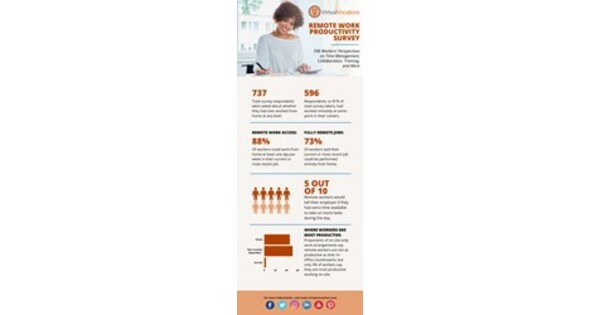“After the end of the COVID-19 pandemic, we noticed an emerging pushback against remote work,” said Virtual Vocations CEO and Co-Founder Laura Spawn. “In some cases, businesses that had been visible supporters of telecommuting prior to and during the pandemic were now making headlines for calling employees back to brick-and-mortar offices.”
Spawn also stated that employers’ post-COVID rallying cries for a return to the office minimized the impact of and value in remote work, which was well established prior to the onset of the pandemic. “Employers claimed it was time to ‘get back to work,’ as if working from a home office in itself was the source of a perceived decline in productivity. But what were workers’ experiences?”
To answer this question, Virtual Vocations launched its “Remote Work Productivity Survey” and polled remote workers about how they spend their time, collaborate, and stay productive. In total, 737 workers responded to the survey, with 596 of them identified, through a qualifying question, as Virtual Vocations’ target audience.
The initial sample pool of 737 volunteers were asked whether they had ever worked remotely at any point in their careers. Interestingly, of 81% respondents stated they had remote work experience. These individuals proceeded to answer the remaining productivity survey questions, the results of which Spawn found meaningful. “Ultimately, we learned that, through remote workers’ own accounts, telework life isn’t unproductive; in fact, it’s quite the opposite.”
Among respondents, 53% confirmed they work exclusively from home, while 9% said they only work on-site. Other remote workers reported to have hybrid schedules (24%), which pair on-site work with work from a home office, or work and travel on a partial remote basis (14%). Although just over half of respondents work remotely 100% of the time, nearly three-quarters (73%) said their jobs could be performed entirely from home. What’s more, 41% of respondents were long-standing remote workers who began their telecommuting journeys prior to the onset of the COVID-19 pandemic of March 2020. And 11% had teleworked for at least 10 years.
Workers’ demand for remote jobs could stem from the convenience of teleworking. Fifty-nine percent of remote workers said they successfully completed fully virtual onboarding and training for their jobs. They also did not feel unwelcomed or excluded from their teams during those processes. In truth, only 9% of remote workers would have preferred their initial employee onboarding and training to be conducted at a physical office.
This data helps dispel the belief that remote workers are not as connected to or engaged with their jobs and coworkers as their on-site counterparts may be. The majority of Virtual Vocations’ productivity survey respondents (65%) added further proof by reporting that they spend between one and four hours per day collaborating with their team members. More than 46% also feel more productive when working from home, while only 3% felt the same way about working on-site.
Remote professionals are so engaged with their jobs that 51% would be willing to tell their employers that they have more time available to take on additional work or responsibilities, with only 5% confessing they only want to do what is expected in their roles, and nothing else. Teleworkers are also willing to use the time they save by skipping the daily commute to catch up on extra work.
But if employers are still concerned about remote worker productivity, perhaps they should evaluate the company culture of their businesses. Forty percent of remote workers stated they feel obligated to work a traditional eight-hour day, even if their work can be completed in less time. Alternatively, when it comes to overwork, just 50% of respondents said they would be willing to tell an employer if they were saddled with too much work. Sadly, 25% expressed they would have to reach a breaking point before opening job burnout dialogue with an employer, and 6% claimed their company’s culture is so poor that employee satisfaction is not a consideration.
To see Virtual Vocations’ full 2023 “Remote Work Productivity Survey” report, visit: https://www.virtualvocations.com/blog/annual-statistical-remote-work-reports/remote-work-productivity-survey-596-workers-perspectives/
ABOUT VIRTUAL VOCATIONS
Founded in 2007 by CEO Laura Spawn and her brother, CTO Adam Stevenson, Virtual Vocations is a small company with a big mission: to connect jobseekers with legitimate remote job openings. To date, Virtual Vocations has helped more than four million jobseekers in their quests for flexible, remote work.
In addition to providing a database of current, hand-screened, and 100% remote job openings, Virtual Vocations offers jobseekers a number of tools to aid in their job searches, including exclusive career courses, downloadable jobseeker content, and career coaching and resume writing services. Virtual Vocations also releases several data-driven reports each year on current trends in remote work.
Virtual Vocations, Inc. is a private, family-owned, and 100% virtual company incorporated in Tucson, Arizona.
PRESS INQUIRIES
Kimberly Back
kim(at)virtualvocations(dot)com
VirtualVocations.com
Media Contact
Kimberly Back, Virtual Vocations, Inc., 1 (800) 379-5092 x. 703, [email protected], https://www.virtualvocations.com
SOURCE Virtual Vocations, Inc.


